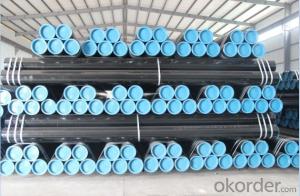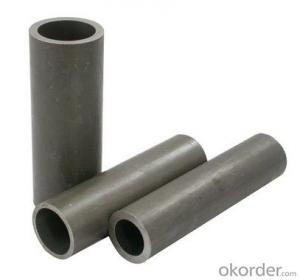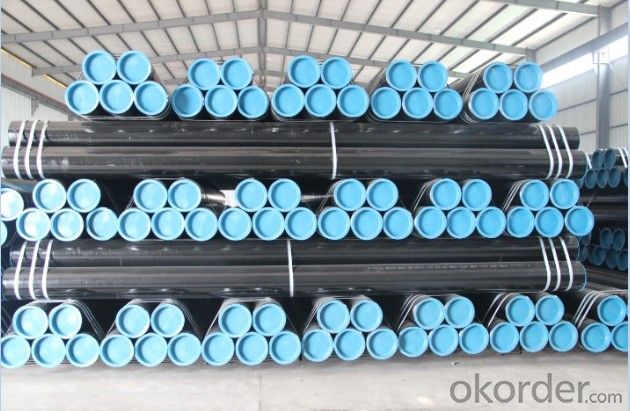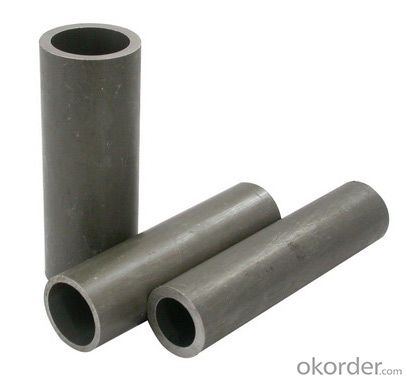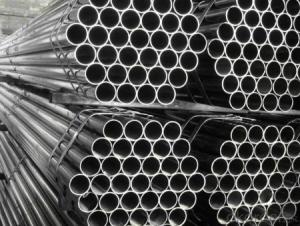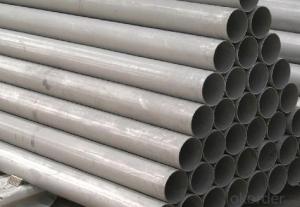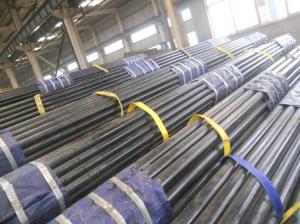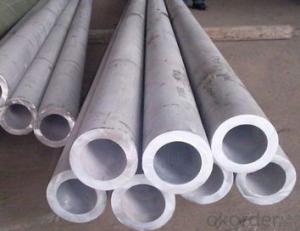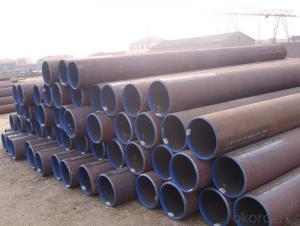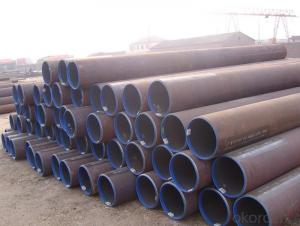Carbon Steel Seamless Pipe For Steel Stuture Application
- Loading Port:
- Tianjin
- Payment Terms:
- TT OR LC
- Min Order Qty:
- 25 m.t.
- Supply Capability:
- 10000 m.t./month
OKorder Service Pledge
OKorder Financial Service
You Might Also Like
Product Description:
1、Carbon Steel Seamless Pipe For Steel Stuture Application Description:
Seamless pipe is formed by drawing a solid billet over a piercing rod to create the hollow shell. As the manufacturing process does not include any welding, seamless pipes are perceived to be stronger and more reliable. Historically seamless pipe was regarded as withstanding pressure better than other types, and was often more easily available than welded pipe.
2、Main Features of Carbon Steel Seamless Pipe For Steel Stuture Application:
• High manufacturing accuracy
• High strength
• Small inertia resistance
• Strong heat dissipation ability
• Good visual effect
• Reasonable price
3、Carbon Steel Seamless Pipe For Steel Stuture Application Images:
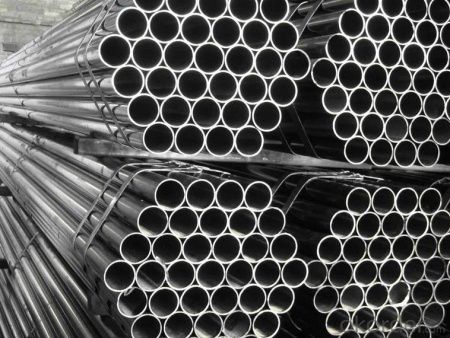
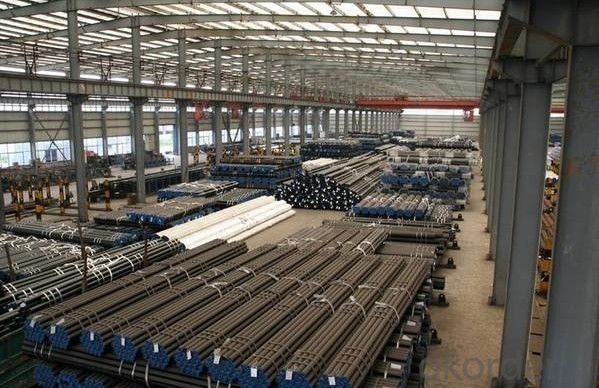
Packaging & Delivery
Packaging Details: | seaworthy package,bundles wrapped with strong steel strip |
Delivery Detail: | 15-30days after received 30%TT |
4、Carbon Steel Seamless Pipe For Steel Stuture Application Specification:
Standard | GB, DIN, ASTM |
Grade | 10#-45#, 16Mn |
Thickness | 8 - 33 mm |
Section Shape | Round |
Outer Diameter | 133 - 219 mm |
Place of Origin | Shandong, China (Mainland) |
Secondary Or Not | Non-secondary |
Application | Hydraulic Pipe |
Technique | Cold Drawn |
Certification | API |
Surface Treatment | factory state or painted black |
Special Pipe | API Pipe |
Alloy Or Not | Non-alloy |
Length | 5-12M |
Outer Diameter | 21.3-610mm |
Grade | 20#, 45#, Q345, API J55, API K55, API L80, API N80, API P110, A53B |
Standard | ASME, ASTM |
1.Material:20#(ASTM A 106/A53 GRB.API5LGRB,GB),45#,16Mn,10#.
2.Specification range:OD:21.3-610mm,WT:6-70mm,length:6-12m or according to the requirement of clients.
3.Excutive standards:GB,ASME API5L.ASTM A 106/A53,Despite of the above standards,we can also supply seamless steel pipe with standard of DIN,JIS,and so on,and also develop new products according to the requirements of our clients!
4.Surface:black lacquered,varnish coating or galvanized.
5.Ends:Beveled or square cut,plastic capped,painted.
6.Packing:bundles wrapped with strong steel strip,seaworthy packing.
5、FAQ of Carbon Steel Seamless Pipe For Steel Stuture Application:
①How is the quality of your products?
Our products are manufactured strictly according to national and internaional standard, and we take a test
on every pipe before delivered out. If you want see our quality certifications and all kinds of testing report, please just ask us for it.
Guaranteed: If products’ quality don’t accord to discription as we give or the promise before you place order, we promise 100% refund.
②How about price?
Yes, we are factory and be able to give you lowest price below market one, and we have a policy that “ for saving time and absolutely honest business attitude, we quote as lowest as possible for any customer, and discount can be given according to quantity”,if you like bargain and factory price is not low enough as you think, just don’t waste your time.Please trust the quotation we would give you, it is professional one.
③Why should you chose us?
Chose happens because of quality, then price, We can give you both.Additionally, we can also offer professional products inquiry, products knowledge train(for agents), smooth goods delivery, exellent customer solution proposals.Our service formula: good quality+good price+good service=customer’s trust
SGS test is available, customer inspection before shipping is welcome, third party inspection is no problem.
Any question, pls feel free to contact us !
- Q: What are the factors that affect the price of steel pipes?
- Some factors that can affect the price of steel pipes include the cost of raw materials, such as iron ore and other metals used in the production of steel, fluctuations in global steel demand and supply, transportation costs, market competition, and government regulations and tariffs. Other factors can include energy costs, labor costs, and the overall economic conditions of the countries involved in the steel industry.
- Q: Can steel pipes be used for oil and gas well production?
- Yes, steel pipes can be used for oil and gas well production. Steel pipes are commonly used in the oil and gas industry due to their high strength and durability, which allows them to withstand the harsh conditions of drilling and production processes. Additionally, steel pipes can efficiently transport oil and gas over long distances, making them a preferred choice in the industry.
- Q: Which is more load-bearing, the same thickness of steel pipe and steel bar?
- The same length, the same pipe diameter, the same material strength is hollow, the ratio of area of steel (solid), and the cyclical and slender radius smaller than the larger, so the longitudinal stability coefficient is smaller, three factors, two factors are weak in steel reinforced, another factor: strength, they are the same, no doubt, steel reinforced bearing less than.
- Q: Can steel pipes be used for roller coaster tracks?
- Yes, steel pipes can be used for roller coaster tracks. Steel is a commonly used material for roller coaster tracks due to its strength, durability, and ability to withstand intense forces and high speeds.
- Q: What's the difference between a cracked carbon steel tube and a liquid carbon steel tube?
- If the material is the same, the process is different from the test.
- Q: What is the weight and strength of steel pipes?
- The weight and strength of steel pipes can vary depending on the specific type and dimensions of the pipe. Steel pipes can range in weight from lightweight options used for plumbing purposes to heavy-duty pipes used in industrial applications. Similarly, the strength of steel pipes can vary, with factors such as the grade of steel and the manufacturing process influencing their strength. It is essential to consult specific specifications or industry standards to determine the weight and strength of a particular steel pipe.
- Q: How are steel pipes insulated to prevent heat gain?
- Steel pipes are insulated to prevent heat gain by applying a layer of thermal insulation material around them. This insulation material acts as a barrier, preventing the transfer of heat from the surrounding environment to the steel pipes. Additionally, the insulation is often covered with a protective outer layer to enhance its durability and resistance to external factors.
- Q: Seamless steel pipe and welded pipe what is the difference?
- Identification method: see the inside of the pipe, because the external, will deal with the welded pipe is inside a gap, you can see some, some, is not easy to see, you can slowly by hand touch, or see the specifications are relatively thin, welded pipe
- Q: Are steel pipes suitable for industrial applications?
- Steel pipes are an excellent choice for industrial applications. They come with several advantages that make them the preferred option in various industries. Firstly, their strength and durability are exceptional, enabling them to withstand high pressure and heavy loads. This makes them perfect for transporting liquids, gases, and solids. Furthermore, steel pipes exhibit high resistance to corrosion, a critical feature in industrial settings where exposure to harsh chemicals, moisture, and extreme temperatures is common. Their corrosion-resistant properties ensure a longer lifespan and reduce the need for frequent maintenance and replacements. Additionally, steel pipes have a smooth interior surface, minimizing friction and allowing for efficient material flow. This is particularly vital in industries like oil and gas, where the smooth flow of fluids is essential for proper operations. Moreover, steel pipes offer a wide range of sizes and thicknesses, allowing for customization and flexibility in design. They can be easily welded and connected, facilitating simple installation and modification as per specific industrial requirements. Overall, steel pipes provide a combination of strength, durability, corrosion resistance, and versatility, making them highly suitable and widely used in various industrial applications such as oil and gas, construction, water treatment, power generation, and chemical processing.
- Q: What are the environmental impacts of steel pipe manufacturing?
- The environmental impacts of steel pipe manufacturing include the extraction of raw materials such as iron ore and coal, leading to habitat destruction and increased carbon emissions. The manufacturing process itself involves high energy consumption and releases greenhouse gases, contributing to climate change. Additionally, the disposal of waste materials and chemicals used during production can contaminate soil and water sources if not handled properly. Overall, steel pipe manufacturing has significant environmental implications that need to be addressed through sustainable practices and technologies.
Send your message to us
Carbon Steel Seamless Pipe For Steel Stuture Application
- Loading Port:
- Tianjin
- Payment Terms:
- TT OR LC
- Min Order Qty:
- 25 m.t.
- Supply Capability:
- 10000 m.t./month
OKorder Service Pledge
OKorder Financial Service
Similar products
Hot products
Hot Searches
Related keywords
